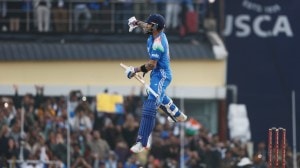KAJAL SABAR, 3, and her brothers — Laden, 10, and Basudeb, 8 — don’t want to return home to their mother in Balukdi Sabarpara village. They want to “stay in school forever”. Having endured a tough childhood — Kajal’s mother allegedly tried to brand her with a fire wood when she asked for more food — the children now lead normal lives at the Puncha Nabadisha Model School at Pandui village in West Bengal’s Purulia district, 300 km from Kolkata.
They are among the 112 children housed at the school started in 2011 by Arup Mukherjee, 42, a constable with Kolkata police, who runs the residential facility with his savings, salary and the occasional help from individuals.

All of the children in the school are Sabars, a community once classified as a “criminal tribe” by the British, and whose lives have seen little change even after the repeal of the Criminal Tribes Act, 1871, in 1952.
“During my childhood, I used to hear stories about the Sabars. My grandfather would tell me that they were uneducated and had no jobs. So I’d always wanted to start a school for them. When I got a job in Kolkata police in 1999, I began saving money. I later borrowed some money and in 2011, began the school, when a local donated this small plot to me,” says Arup.
From 20 students in two rooms and a veranda in 2011, the school now has nine rooms, a separate kitchen, class rooms, CCTV cameras, a separate wash room and toilet on around 13 kathas, or over 9,000 sq ft, of land. It provides lodging, food, education, clothes, uniforms and education material, all free of cost to children aged between 3 and 14 years.
 Students at Puncha Nabadisha Model School. (Photo: Subham Dutta)
Students at Puncha Nabadisha Model School. (Photo: Subham Dutta)
Arup says there has been an influx of funds after he was felicitated in a Bengali television show hosted by former Indian skipper Sourav Ganguly. “After the function, the channel and its sponsors gave me some money. I built another room. Some former students of Ramakrishna Mission school give me a quintal of rice and 10 kg of pulses every month. Individuals also contribute sometimes. Some people heard about the school through Facebook and visited us,” says Arup.
He also collects Rs 2,000 a month from his father and uncle, both retired police personnel. Apart from the Puncha block health centre, local doctors also ensure that the children are treated for free.
Story continues below this ad
The constable is also helped by the fact that the four teachers he employs mostly forgo their monthly salary of Rs 500. “When Arup kaku (uncle) asked me to teach, I agreed. Whenever I need the salary, I ask him. It feels great to teach the children and spend time with them. I will continue to do this, until I get a proper job,” says Piu Pramanik, 24, one of the teachers.
Of the children who have completed their education up to Class IV, the model school has ensured that 60 of them joined the local government-run Madhyamik Siksha Kendra, while eight every year are sent to the Loulara Radharaman Academy School, a government-sponsored higher secondary school in the area. “We admit them and take no fees. However small, his work is a genuine attempt to bring Sabars into mainstream society. Many of the children are first-generation school goers,” says Amulya Chakraborty, headmaster of Radharaman school.
For the Sabars, the school is a respite from the ostracisation and “hounding” from local police. “Other communities still treat us as untouchables. The police look at us with suspicion and often conduct raids here. Arup’s school gives our children food and clothes and a better place to sleep,” says Sarala Sabar, who has sent her two girls Tulika, 11, and Ashtami, 8, to the model school.
“Maybe, my children will become someone big one day,” she says.

 Piu Pramanik conducts a class in one of the classrooms. (Photo: Subham Dutta)
Piu Pramanik conducts a class in one of the classrooms. (Photo: Subham Dutta)
 Students at Puncha Nabadisha Model School. (Photo: Subham Dutta)
Students at Puncha Nabadisha Model School. (Photo: Subham Dutta)





